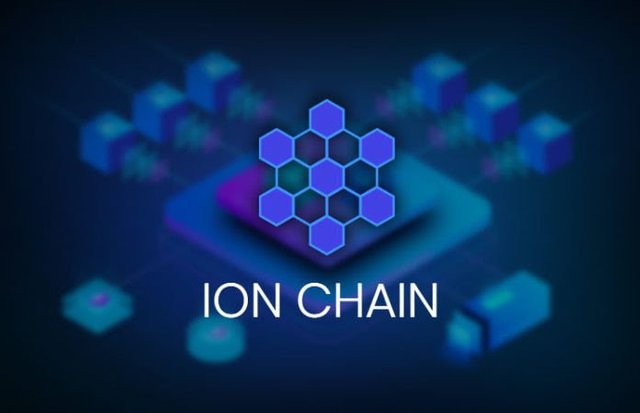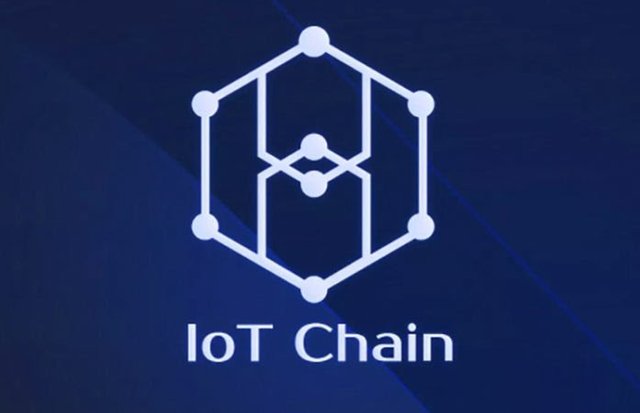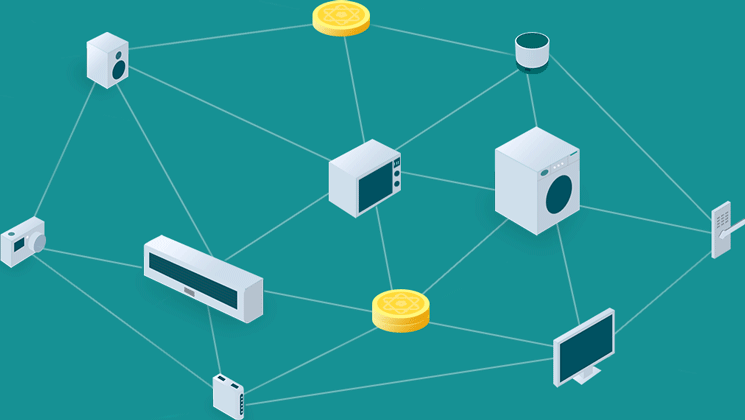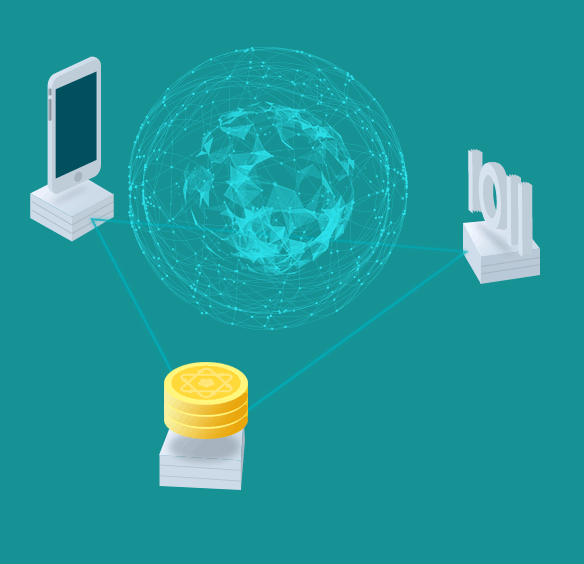IonChain- The hybrid of Blockchain and Internet of Things
“With the emerging Internet of Things technology collecting terabytes of personal data; The question is: are we ready to unbutton our online dress shirt while many are still just loosening their collars?”
Parker Trewin
Senior Director of Content and Communications, Aria Systems



Introduction
The evolution of technology has graced mankind with various innovations, that has helped to address plaguing problems and ease the way people carry out their daily tasks. Truly the importance of technology in this age cannot be overemphasized.
The Internet of things and Blockchain are offsprings of this revolutionary advancement in technology.
Internet of things refers to things: objects, devices and machines that are interoperable and can be recognized via digital networks.
Since it's introduction 20years ago, IoT has evolved over the years, undergoing frequent reforms and improvements, however the goal of IoT has remained constant: *To coordinate interconnected devices and machines, and retrieve the data that originates from the network of devices.
The introduction of innovative gadgets like Google Home has proven that objects, devices and machines can be merged, coordinated and the data the emanates from this interaction can be organised and employed to generate value.
The interaction of machines has truly paved the way for unique data generation. Enormous data is generated from machine-machine interaction, making it a reliable source of data generation.
Compared to the traditional people-generated data, data generated from machines are consistent, genuine and reliable.
However, certain problems plague the ecosystem of IoT, that has limited it adoption in all scenarios.


The Problems of IoT.
1. Non-Existence of a Business Model.
With the rapid revolution in the information industry, a well designed business model is always erected to see to its profiting. However, IoT is a different case.
The business model of this prospecting innovation remains in the dark: save for THE RFID (Radio Frequency Identification) which is perhaps the only deployment of IoT on a large scale.
Enormous chunks of data is generated by the IoT, sadly they have not been put to practical use in a large scale business model.
The only obvious benefit of IoT seem to be the improved performance of interoperable electrical devices.
2. No Privacy Protection and Data Security
One main characteristic of IoT is data collection of not just machines, but of individuals and businesses too. While this is beneficial, it is a rose with thorns.
Over the years, privacy violation of users of smart devices has come under heavy criticism. The personal data of individuals involving their day-to-day activities are collected and stored on centralized storage servers discreetly without the consent of the owners.
These centralized storage servers belongs to a few major companies, as a result of this individuals and businesses do not have control over who, where and what their data is used for.
This stored data is sold off to data analysis companies, who commercialize and exploit this data for different purposes ranging from advertising to survey.
This is totally unacceptable as it takes all the power of control off the user and places it the hands of owners authorized centralised servers.
This is a major cause for concern, as these data can be subject to theft or hack and result in the loss of private and sensitive information to wrong hands.
3. Hoarding of Useful Data
As earlier stated, most of this data is stored on centralized storage servers belonging to various major companies. This has created a huge barrier in data availability and sharing.
IoT offers promising prospects, which is obvious to major companies, who are willing to take advantage of the information age and leverage against competitors.
These has resulted in a refusal to share data with other companies who are seen as competitors by the company housing the data.
This has diminished the value and potential of data, which thrives only upon its sharing and circulation.
4. Slow execution
The IoT industry is built upon cloud computing, which works just perfect in settings involving electrical appliances. However, it is limited in realtime scenario such as Virtual Reality and Industrial IoT which requires rapt response.
Cloud services is limited in realtime scenario because processing of commands could take up to hundred of milliseconds, which is slow in those cases.

The Solution is IONChain

IONChain is a hybrid of blockchain and IOT, it employs the decentralized peer-to-peer characteristics of the blockchain to ensure security, storage capacity and total reform of the IoT ecosystem.

Origin of IONChain
IONChain is coined from the idea of "IONS". In 1889, Swedish Physicist Arrhenius, proposed his theory of Ionization, where he identified ions as the foundational particle in the formation of substances.
IONChain draws similarity from this by acting as the fundamental connecting link between all IoT devices with the aim to foster decentralized peer-to-peer communications.
IONChain employs smart contracts to ensure the interoperability of devices and the exchange of value between them.


How IONChain Addresses The Problems.
1. Addressing The Problem of No Business Model
IONChain addresses this problem by introducing smart contracts. These smart contract are strategically designed to address specific cases and afford a platform for device-human and device-device interactions.
Data exchange is supported on the IONChain decentralized network, while transferring of value is realised by the transaction of operation authority.
Take for example a residential district close to the CBD area, where there is often a huge demand for car parking. Some of the households are willing to rent out their empty parking lots if they are not making use of them. By installing locks , the households and those seeking smart parking can automatically control who uses the parking space via smart contract and complete the transaction without any human intervention. Simultaneously property management staff can connect with IONChain as another node. After the transaction has been completed the profits will be calculated and distributed accordingly. Transaction settlements within the system will be dependent solely on IONC. There is no need to involve any bank or other third party institutions. No transaction fee will be required
2. Addressing The Problem of No Privacy and Data Protection
IONChain employs local and distributed nodes as storage points for IoT data and also fortifies it with encryption to guarantee security of data and put back the control of data in the hands of users.
This local storage points and data encryption grants user the option to use their data by themselves or exchange data with other nodes willing to pay for it.
3.Addressing the Problem of Hoarding of Data
The value of data is dependent on its circulation, usage and efficient processing. IONChain understands this and encourages efficient data processing by monetizing it and speeding up data circulation via 2 data exchange innovations:
-B2B data exchange
IONChain incorporates traditional production enterprises as data providers and functions as data trading nodes which provides standardized auxiliary point of interconnection for data.
Devices employed in entering data, can use the interfaces provided by the trading nodes to upload unified and packaged IoT data to the IONChain ledger.
This packaged IoT data can be purchased, subject to releasing the private keys for downloads, after funds transferred have been recorded of the IONChain ledger.
Smart contracts are employed in facilitating automated data transactions.
-C2B data exchange
IONChain makes data circulation and availability efficient. Individuals can upload personal data to the IONChain ecosystem, which can be monetized.
Companies in need of this data can have access to it IonChain network in exchange for funds and employ them to create value.
On the IONChain ecosystem Data provider (individuals or businesses) can participate in making data available via single or multiple IoT data sources and data buyers can take advantage of this opportunity by publishing data inquiries on the IONChain network.
4. Addressing The Problem of Slow Execution
Since the inception of IoT 20years ago, it has achieved great landmarks, it has been incorporated into different spheres of life.
However, it's application has been limited to a few areas due to lacking fast response as a result of IoT being built upon cloud computing technology.
However, IONChain solves this problem by incorporating Edge Computing Technology to its ecosystem.

.png)
Edge Computing Technology VS Cloud Computing Technology.
Edge computing technology is a platform that functions via a distributed information technology architecture in which storage, computation and processing of data is at the periphery of the network and very close to the originating source.
Edge computing would address the plaguing problems of the IoT sector by providing fast connection, security and privacy of data and real-time operation.
It is a well known fact that the sophistication of traditional cloud computing cannot guarantee realtime responses demanded in many application scenarios, the emergence of Edge computing technology has proved better in addressing that constraint and the great prospect it offers has gained wide acceptance, leading to practitioners calling for the total replacement of cloud computing technology with edge computing technology.
However, this should not be the case, Edge should be seen as a complement of cloud computing, which can serve as an optimization layer under the right conditions.
IoT has evolved since its inception, now wired to process more complicated data generated from smart devices. Therefore it is pertinent to overhaul the traditional IoT network by integrating Edge computing architecture with cloud computing to create a perfect and efficient system.
Furthermore, Edge computing technology eliminates the feedback delay in Internet of Things, Internet of Vehicles and even Smart home technologies. This would ultimately increase the adoption of IoT and improve user experience significantly.
Cloud computing is frequently plagued by data breaches and hacks, despite the promises by top cloud service providers to curb this issue, it has remained a plaguing issue of the IoT, which has in turn threatened the privacy of users.
Edge computing technology would return power and control of data to users, who can now decide who has access to it.

IONChain Ionization Algorithm.

The blockchain, which boasts of incredible feats since its inception comprises of two core functions: Value Creation and Value Transfer
The success of Bitcoin and Ethereum rests on these core functions by an algorithm that combines both the creation and transfer of value simultaneously.
IONChain believes the next generation of IoT network architecture would be built upon Internet of Value and as such, it comes up with its unique IONIZATION ALGORITHM.
Ionization algorithm stems from the Chemical term known as Ionization: which involves the loss or gain of electron(s) by an atom or molecule to become an ion i.e positively or negatively charged.
By extension, the ionization algorithm of IONChain unlike that if the Bitcoin and Ethereum separates the core functions of the blockchain.
IONChain believes that it's futuristic goal as an ecosystem cannot be accomplished by combining Value creation and transfer and therefore the need for this unique separation.
The IONChain Ionization Algorithm is designed to grant allocation for every IOT device to function as a mining machine, this automatically puts them in a position to create value.
However, IONChain understands that every value created by an IoT device differs from another in value, owning to the function and type of device.
As a result of this separation, the value transfer layer is responsible for the exchange of value within the IONChain ecosystem while the value creation layer caters for allocating a strategically designed algorithm to every IoT device on its ecosystem, which converts every unique value created to its worth in IONC coins which can now be transferred using the value creation layer.


IONChain Value Creation Process
1. Value is generated by IoT devices connected to the IonChain ecosystem or Edge computing centers near the device.
2. Value is verified by relevant interested parties to ascertain the value of data generated by IoT devices.
3. Value is evaluated jointly by relevant parties to determine that value is genuine and original. This process serves as a firewall against harmful attacks such as double spending.
4. Value is confirmed, packaged and handed to the value transfer layer to be presented as a digital asset on the IonChain ecosystem.

IONChain Value Transfer Process
The value transfer process on IONChain is divided into six layers:
1. Application Layer
This is the user interface layer of the IONChain ecosystem. It is modified with anti-counterfeit verification for IoT devices and vendors.
It also incorporates the following services:
- Data Validation
- Data Query
- Device Registration
- Wallet Query
- Vendor Query
2 Service Layer
This is responsible for extracting the numerous internal modules of the IONChain ecosystem to facilitate external interfaces for users through the server
3. Protocol Layer
This is responsible for providing formal set of rules for data exchanges on the IONChain network.
4. Smart Contract Layer
Smart contracts are an integral part of any blockchain based ecosystem on IONChain. The smart contract layer keep users on track, to ensure the legal and safe employment of stored data to create value. It serves as a firewall to ensure user requirements are in synchrony with the blockchain algorithms.
5. Blockchain Layer
This is the most important part of IONChain ecosystem it contains an integral modified classic POS algorithm known as IPOS, which elect and grants a measure of control to stakeholders
6. Data Storage Layer
This is responsible for data storage on the blockchain based on IPFS and BigChainDB.

IPFS and BigChainDB
IPFS stands for Interplanetary File System. It is a protocol strategically designed to enable peer-to-peer method of storing and exchanging hypermedia in a file system that is separated into categories.
IPFS is employed to store content-addressable files which contains information that cannot be recovered by it content but by the location.
Storage of content addressable file guarantees a unique name for each file on every computer.
IONChain also employs IPFS system to provide legal identification of all IoT devices. IPFS can store transaction records, core and smart contract data only, however it fails in storing business data. Therefore BigChainDB is employed by IONChain to cover for the inability of IPFS to store business data.
As a result IPFS provides large data storage capacity while BigChainDB provide decentralized business data storage alongside immutable assets registration and transfer.


IONChain Vision: "One Device, One Coin, One Code"
This is a concept of IONChain which facilitates the integration of IoT devices so as to eliminate the barrier of communication by employing a universal standard: the edge computing technology.
Every IoT device is employed as a mining device and would be physically embedded with an identification code to guarantee uniqueness.
Furthermore, every IoT device employed as a mining machine is entitled to mining rewards in form of IONC token.

.png)
IONC Token
This is the official and only authorized cryptocurrency of the IONChain ecosystem. IONC token is employed to reward IoT devices and data providers who ate an integral part of the IonChain ecosystem.
The IONC token is the only avenue for creating value within the IONChain ecosystem.

Token Sale
Road Map
Meet The Team
The Consultants
Use Case
Simon is a Nigerian Billionaire, He builds a smart home home from scratch to finish with the help of technologists from Europe. He is enjoying the comfort that owning a smart home brings not being aware of the fact that the data generated from the interaction of devices and machines in his home are of immense value.
Soon the Nigerian government wants to undergo a project to ascertain the efficiency and possibility of having smart technology and smart homes in Nigeria and contacts the European technologists who built Simons smart home.
Simon home is cited as a reference point and he is told about IONChain where he can exchange the data that accrues from the interaction of devices in his home.
He checks out and joins IONChain and the devices in his home are registered as mining devices and are given unique ID codes.
He now earns mining rewards in form of IONC tokens and also receives payment for the exchange of useful data with the Nigerian government.

Conclusion
With IoT going mainstream, a point would have to come where all the plaguing problems would be addressed.
IONChain is a perfect solution to this long age problem, by incorporating the vast potentials of the blockchain industry to IoT, security and decentralization of data is guaranteed.
Users can now how full control of the data resulting from their devices and can exchange it in return for IONC tokens.
For More Information:
IONChain Website
IONChain BitcoinTalk Explanation
IONChain Whitepaper
IONChain YouTube
IONChain Twitter
IONChain Medium
IONChain LinkedIn
IONChain Github
IONChain SteemIt
IONChain Telegram

To participate in this contest by @Originalworks click here
Please note that IONChain.org is the IONChain website not ionchain.io. They are completely different.
Twitter Post
https://twitter.com/Rubyzzyzx/status/1059881730415431680?s=20
ionchain 2018
.png)

.png)
.png)
.png)
.png)
.png)